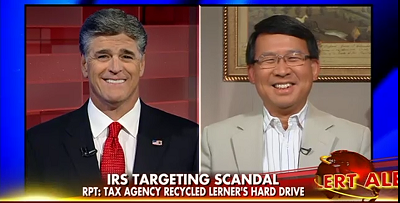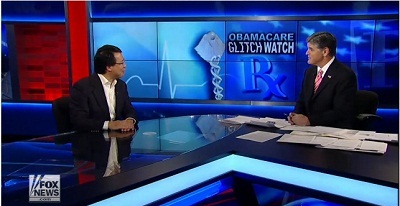 FMS President Luke Chung on the Sean Hannity TV and Radio Shows
FMS President Luke Chung on the Sean Hannity TV and Radio Shows
Starting with FMS President Luke Chung's national discourse on the Healthcare.gov web site, he has appeared numerous times on the Sean Hannity TV and Radio Shows.
- Missing FBI Text Messages
- WikiLeaks, Julian Assange, Russian Hacking, and Cyber Warfare
- Lost Emails at the IRS
- Healthcare.gov Web Site Discussions
 The Sean Hannity Radio Show, January 22, 2018
The Sean Hannity Radio Show, January 22, 2018
Background
On January 22, 2018, Luke Chung was on the radio show with Sean Hannity and Andrew Ziem. The three of them discussed the technology behind the ability to retrieve text messages that were deleted. Luke commented specifically on:
- How text messages are stored on a senderís/receiverís device, unlike emails which on stored in a central server.
- The ability to retrieve an email that has been deleted is more likely than trying to retrieve a text.
![]() To
listen to the interview and more insight on these issues, visit Luke Chung's blog post,
Sean
Hannity Radio Show Interview on Missing FBI Text Messages.
To
listen to the interview and more insight on these issues, visit Luke Chung's blog post,
Sean
Hannity Radio Show Interview on Missing FBI Text Messages.
The Sean Hannity Radio Show, January 4, 2017
Background
The day after an amazing personal interview of Julian Assange by Sean Hannity aired on his TV show, FMS President Luke Chung was invited to discuss the related technology on his radio show.
Hannity traveled to London to interview Assange at the Ecuadorian Embassy where heís seeking asylum. They discussed an overview of Assangeís role as founder of WikiLeaks, and their obtaining and publishing the emails from the Democratic National Committee the weeks before the US Presidential election. Some people attribute Hillary Clintonís loss to the revelations in those emails especially from John Podesta, the former White House Chief of Staff and Chairman of the Clinton campaign. They are also accusing the Russians for hacking (stealing) and providing the data to Assange so Donald Trump could win the election.
Radio Show
On January 4, 2017, Luke was on the radio show with Sean Hannity and Brigadier General Eli Ben Meir, former Israeli Military Intelligence chief. The three of them discussed the WikiLeaks disclosures. Luke commented specifically on:
- Cyber attacks and the security breach at OPM disclosed non-classified government employees and by omission who were covert at American Embassies globally.
- Noting Julian Assangeís careful word choices to exclude Russia as source without excluding them as the ultimate source of his sources.
- The need for WikiLeaksí to keep their sources confidential and how they amplified the data from Bradley Manning and Edward Snowden.
- Different approaches to preventing cyber attacks depending on the cause.
ďItís one thing when someone steals your car because they broke into it. Itís another thing when someone steals your car because you left your keys in the ignition.Ē
![]() To listen to the interview and more insight on these issues, visit
Luke Chung's blog post, Sean Hannity Radio
Show Interview on Julian Assange, WikiLeaks, Russian Hacking, and Cyber Warfare.
To listen to the interview and more insight on these issues, visit
Luke Chung's blog post, Sean Hannity Radio
Show Interview on Julian Assange, WikiLeaks, Russian Hacking, and Cyber Warfare.
How did the IRS not have backups and lose Lois Lerner's emails and other files? Who came up with their backup and disaster recovery plan? Wrong policies, incorrect execution? Incompetence or intentional?
Hannity TV Show on June 19, 2014
A 3.5 minute live interview with Sean Hannity in New York with Luke at their Washington, DC studio.
Transcript (S for Sean, L for Luke)
S: The recycling of Leanerís hard drive is significant because now, according to the Obama administration, it is likely her emails, which may have been recoverable after the 2011 computer crash will never be found. How convenient. Now luckily my next guest is a computer expert and is here to tell us if those claims are in fact true and accurate. So with me is FMS Inc. President, a friend, Luke Chung. You may remember Luke. You told us at the time that the whole Obamacare website was being unveiled that you could have built a better website for about a million dollars. I remember that quote. Iíll never forget it.
L: Thank you very much for having me back.
S: OK, let me put up on our screen for the people at home. This is a diagram showing the various locations of documents from a server. You know itís pointing to a BlackBerry, a computer, etc. This goes to my question to you Luke, that is for example everyoneís focused on the hard drive crash but again I have multiple email accounts. In my multiple email accounts, I can get every one of those emails on my iPhone, my iPad, two work computers, a home computer, my wifeís computer or any computer Iím using. Why are they focused on the hard drive so much and do you believe that these are not recoverable?
L: You know it really comes down to what their policies were on preserving old data. So, yeah maybe theyíve they lost it. Maybe it was due to bad policy, maybe it was due to bad implementation of back-ups and things they should have done. With regards to the data in emails you talk about in multiple devices, that means the data is stored on the central server. So whether itís on your mobile device, laptop, PC, whenever you connect, you get the emails that are on there, so itís not really saved as a master copy on your desktop.
S: So you think this might not be recoverable is what youíre saying; because there are federal agency record keeping record here (pointing to a list of requirements). You've got requirements for emails; you keep names, addresses, timestamps. You keep the attachments, they've gotta be preserved. You got to retain the full names on directories or distribution lists so to answer your question, there is the answer. Theyíre supposed to keep them.
L: Right, the way you analyze this is like analyzing a crashed airline jet. What were the policies? What were the things they were supposed to do? Are those the things youíre supposed to do, right? Maybe the policies are wrong or you did not implement the policies correctly. And itís my understanding that they had a six months backup retention policy at the IRS.
S: Yes, I just, in this day and age, sort of like the website when we had you on back in the day when the website was unveiled and what a disaster that was, 400, 600, 700 million dollars spent on this thing and they canít get it right, Iím just trying (short pause). Why do I know that every email that I probably sent in the last ten years is probably recoverable, but not Lois Learnerís email during the important period. How convenient, right?
L: Right, well it seems like the emails should be recoverable; but you know probably what isnít recoverable is other files she had on her hard disk, Word documents, spreadsheets, whatever; those may be the only copies. The other area that needs to be explored is she may have sent email on other platforms that werenít the government email system.
S: They canít build a website so the idea that theyíre going to find who she wrote, check their servers, check their deletions. Itís one big mess, but Luke thank you. I wish you did build Healthcare.gov.
L: Thank you for having me.
 Sean Hannity Radio Show, June 20, 2014
Sean Hannity Radio Show, June 20, 2014
A more in-depth 14 minute discussion with David Kennedy on the radio show. Luke starts about 2:30 after the introduction.
Sean Hannity TV Show: October 24, 2013
Sean Hannity liked Luke's radio interview so much, he invited him to join him on his TV show recorded in New York City on October 24, 2013. Watch this lively 4 minute interview:
The Healthcare.gov Web Site is a Technological Disaster
"It's just an awful website...As I was using it, the system kept crashing on me. And as soon as it started crashing, I was like 'Oh, my God, this system is not ready for prime time.' The types of crashes I was experiencing had nothing to do with too many users. It was just bad...They had developers who I sensed had never been paid to create software before. It was really amateurish. It looks like it was their first job...The programming was really bad; it looks like it wasn't tested, and even if they had programmed it properly and tested it, the design was wrong. So it really didn't matter whether they did it right...They haven't thought through the buying process...$200 million at $200 an hour is a million man hours, 500 man years. How did they have time to use 500 man-years? Or triple that, 1500 man years..This is just filling out a paper form and getting a subsidy...It shouldn't be that complicated."
December 4, 2013
Appearing with David Kennedy, Luke Chung discusses how the Healthcare.gov web site should have cost less and been designed with security up front.
"The user interface is just the automation of a 12 page paper form. That is a slam dunk for any web development company. It is very easy to do, very straightforward. And then the back end stuff is more complicated but certainly very doable. This does not need to be a Silicon Valley space project. This is bread and butter business application web work."
Articles Written from the Broadcast
- Tech Experts: HealthCare.gov Should Cost Less Than $10 Million
- Whatís a few hundred million dollars between friends?
Sean Hannity Radio Show
 October 18, 2013:
Luke explains the problems with the Healthcare.gov web site for Sean Hannity in this interview (15 minutes).
October 18, 2013:
Luke explains the problems with the Healthcare.gov web site for Sean Hannity in this interview (15 minutes).- November 5, 2013: As Congress starts formal investigations into the Healthcare.gov fiasco, Sean Hannity invites Luke back to his radio show to better understand the mess, what to do about it, and how the government contractors charged so much and delivered so little. Begins with Congressional inquiries of the CGI Federal contractors before Luke's interview starts. Concludes with a nice recommendation to the administration to hire FMS! (10 minutes)
- November 14, 2013: Luke discusses how the Healthcare.gov government contractors abused taxpayers in addition to being inept. Also discussed how the website could be designed properly and how we created the Logistics Support System for the United Nations, deployed in 80 countries, for under $500K. (10 minutes)
Connect with Us
FMS Resources
"Thanks! FMS products are extremely powerful, unbelievably stable, great timesavers, easy to learn, and an absolute pleasure to work with!"
Alison Balter, Author, Trainer, Consultant



 Email Newsletter
Email Newsletter Facebook
Facebook Twitter
Twitter



